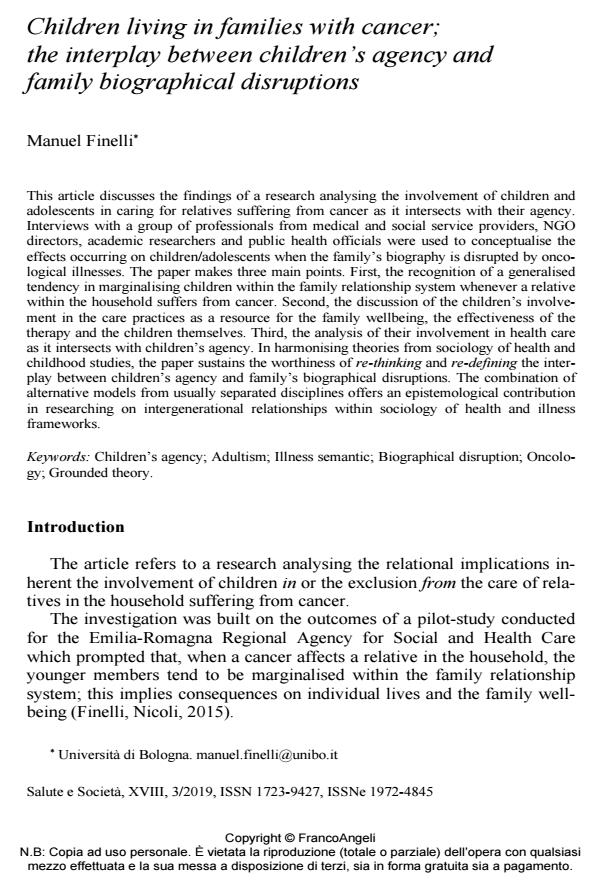Children living in families with cancer; the interplay between children’s agency and family biographical disruptions
Titolo Rivista SALUTE E SOCIETÀ
Autori/Curatori Manuel Finelli
Anno di pubblicazione 2019 Fascicolo 2019/3
Lingua Inglese Numero pagine 12 P. 72-83 Dimensione file 147 KB
DOI 10.3280/SES2019-003007
Il DOI è il codice a barre della proprietà intellettuale: per saperne di più
clicca qui
Qui sotto puoi vedere in anteprima la prima pagina di questo articolo.
Se questo articolo ti interessa, lo puoi acquistare (e scaricare in formato pdf) seguendo le facili indicazioni per acquistare il download credit. Acquista Download Credits per scaricare questo Articolo in formato PDF

FrancoAngeli è membro della Publishers International Linking Association, Inc (PILA)associazione indipendente e non profit per facilitare (attraverso i servizi tecnologici implementati da CrossRef.org) l’accesso degli studiosi ai contenuti digitali nelle pubblicazioni professionali e scientifiche
This article discusses the findings of a research analysing the involvement of children and ado-lescents in caring for relatives suffering from cancer as it intersects with their agency. Inter-views with a group of professionals from medical and social service providers, NGO direc-tors, academic researchers and public health officials were used to conceptualise the effects occurring on children/adolescents when the family’s biography is disrupted by oncological illnesses. The paper makes three main points. First, the recognition of a generalised tendency in marginalising children within the family relationship system whenever a relative within the household suffers from cancer. Second, the discussion of the children’s involvement in the care practices as a resource for the family wellbeing, the effectiveness of the therapy and the children themselves. Third, the analysis of their involvement in health care as it intersects with children’s agency. In harmonising theories from sociology of health and childhood studies, the paper sustains the worthiness of re-thinking and re-defining the interplay between children’s agency and family’s biographical disruptions. The combination of alternative models from usually separated disciplines offers an epistemological contribution in researching on intergen-erational relationships within sociology of health and illness frameworks.
Parole chiave:Children’s agency; Adultism; Illness semantic; Biographical disruption; Oncology; Grounded theory.
Manuel Finelli, Children living in families with cancer; the interplay between children’s agency and family biographical disruptions in "SALUTE E SOCIETÀ" 3/2019, pp 72-83, DOI: 10.3280/SES2019-003007